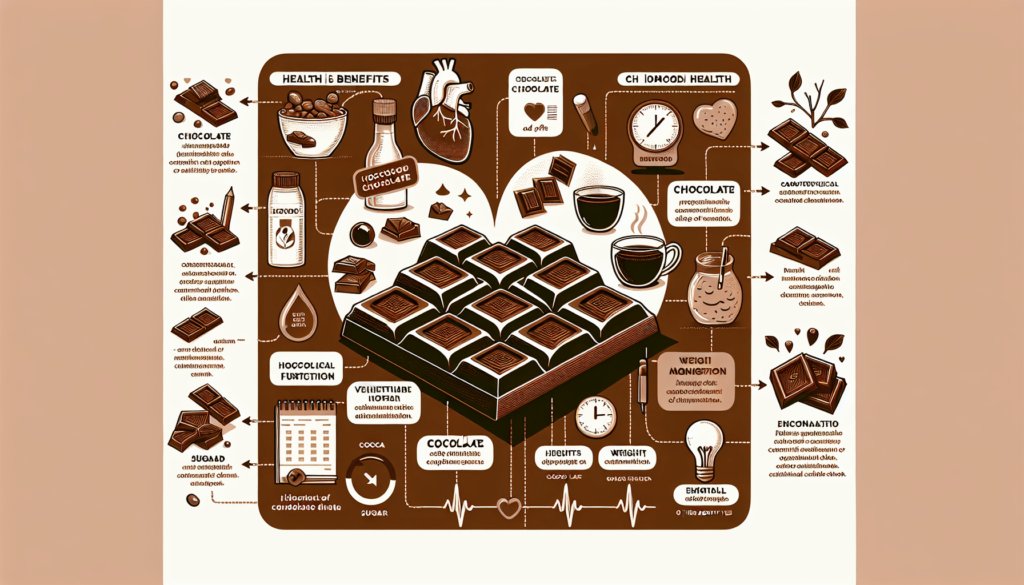You may have wondered at some point whether chocolate is good or bad for your health. Well, fear not, because this article aims to shed some light on this topic. We will explore the potential health benefits and risks associated with chocolate consumption, providing you with a balanced perspective on whether this indulgent treat can actually be a part of a healthy lifestyle. So, grab your favorite chocolate bar and let’s discover the truth behind the delectable world of chocolate!
Nutritional Composition
When it comes to understanding the nutritional composition of chocolate, it’s important to take a closer look at both macronutrients and micronutrients.
Macronutrients
Chocolate contains macronutrients, which are essential for providing energy to the body. These macronutrients include carbohydrates, proteins, and fats. While the exact composition of macronutrients may vary depending on the type of chocolate, in general, chocolate is a significant source of carbohydrates and fats.
Micronutrients
In addition to macronutrients, chocolate also contains micronutrients, which are necessary for various functions in the body. Some of the key micronutrients found in chocolate include magnesium, iron, and potassium. These micronutrients play essential roles in maintaining overall health and well-being.
Health Benefits
Contrary to the notion that chocolate is only a sweet indulgence, it actually offers a range of health benefits when consumed in moderation.
Antioxidant Properties
One of the remarkable health benefits of chocolate is its antioxidant properties. Chocolate is rich in flavonoids, which are powerful antioxidants that help protect the body against free radicals. These free radicals can cause damage to cells and are associated with various chronic diseases. By consuming chocolate, you can boost your antioxidant intake and support your body’s defense against oxidative stress.
Improved Heart Health
Eating chocolate in moderation has been linked to improved heart health. The flavonoids present in chocolate have been shown to have a positive effect on cardiovascular health by reducing the risk of heart disease. These compounds help improve blood flow, reduce inflammation, and prevent the formation of blood clots. Regular consumption of chocolate, especially dark chocolate, has been associated with a lower risk of heart-related issues.
Enhanced Cognitive Function
Chocolate has also been found to have a positive impact on brain health and cognitive function. The flavonoids in chocolate can increase blood flow to the brain and enhance cognitive performance. Research suggests that chocolate consumption may improve memory, attention, and overall brain function. So, next time you have a challenging task ahead, a small piece of chocolate might be just what you need to give your brain a boost.
Mood Booster
We often turn to chocolate during times of stress or when we need a little pick-me-up, and there’s a scientific reason behind it. Chocolate contains phenylethylamine (PEA), a compound that stimulates the release of endorphins and promotes feelings of pleasure and happiness. Additionally, chocolate contains tryptophan, an amino acid that helps the body produce serotonin, a natural mood regulator. So, next time you’re feeling a bit down, a small square of chocolate could be just what you need to lift your spirits.

Potential Health Risks
While chocolate offers numerous health benefits, it’s important to be aware of potential health risks associated with its consumption.
Caloric Content
One of the concerns with chocolate consumption is its caloric content. Chocolate, especially varieties with added ingredients, can be high in calories. Regularly consuming large quantities of chocolate can contribute to weight gain and increase the risk of obesity. It’s essential to be mindful of your overall caloric intake and practice moderation when enjoying chocolate.
High in Sugar and Fat
Another potential health risk is the high sugar and fat content in chocolate. Most chocolate products contain added sugars and unhealthy fats, which can impact blood sugar levels and increase the risk of chronic diseases such as diabetes and heart disease. Opting for chocolate with lower sugar content and healthier fats, such as dark chocolate, can help mitigate these risks.
Addictive Nature
Chocolate has been known to be addictive, with some people finding it challenging to control their consumption. The combination of sugar, fat, and other pleasurable compounds in chocolate can trigger reward centers in the brain, leading to cravings and overeating. It’s crucial to be mindful of your chocolate consumption and practice self-control to avoid developing unhealthy eating habits.
Caffeine Content
Chocolate contains caffeine, a stimulant that can affect sleep quality and cause jitteriness in some individuals. While the amount of caffeine in chocolate is relatively low compared to coffee or energy drinks, those who are sensitive to caffeine should be cautious about consuming large quantities of chocolate, especially in the evening.
Quality and Type
When it comes to chocolate, the quality and type can make a significant difference in its nutritional profile and overall health benefits.
Cocoa Content
The cocoa content of chocolate plays a crucial role in determining its health benefits. Dark chocolate, which typically has a higher cocoa content compared to milk chocolate, contains more flavonoids and antioxidants. Opting for chocolate with a higher percentage of cocoa solids allows you to reap the maximum nutritional benefits and enjoy a more intense chocolate flavor.
Processing Methods
The processing methods used in chocolate production can also impact its nutritional value. Some chocolates undergo extensive processing, which can result in the loss of certain beneficial compounds. Opting for minimally processed or raw chocolate can help preserve more of the natural goodness found in cocoa beans.
Added Ingredients
Many chocolate products on the market contain additional ingredients such as nuts, caramel, or nougat. While these added ingredients can enhance the taste and texture of chocolate, they can also increase the overall caloric content and potentially introduce allergens or other substances that may not align with your dietary preferences or restrictions. Choosing plain chocolate without any added ingredients allows you to have more control over the nutritional value of your chocolate.

Quantity and Moderation
When it comes to enjoying chocolate, moderation is key. Here are some guidelines to keep in mind:
Recommended Servings
The American Heart Association recommends limiting added sugars, including those found in chocolate, to no more than 25 grams per day for women and 36 grams per day for men. It’s important to be mindful of your overall sugar intake from all sources, including chocolate, to maintain a balanced diet.
Portion Control
Practicing portion control is essential when consuming chocolate to avoid excessive caloric intake. Instead of devouring an entire chocolate bar, savor a small piece or two and focus on enjoying the taste and texture. By being mindful of portion sizes, you can still indulge in chocolate without compromising your overall diet.
Frequency of Consumption
Enjoying chocolate occasionally is perfectly fine, but it’s best not to make it an everyday habit. Reserve chocolate as a special treat or for certain occasions rather than incorporating it into your daily routine. By consuming chocolate in moderation and as part of a well-balanced diet, you can continue to enjoy its benefits without negative consequences.
Dark Chocolate vs. Milk Chocolate
When choosing between dark chocolate and milk chocolate, there are some key differences to consider.
Higher Cocoa Content
Dark chocolate generally has a higher cocoa content compared to milk chocolate. As mentioned earlier, a higher cocoa content means increased levels of antioxidants and flavonoids, making dark chocolate a better choice from a nutritional standpoint.
Lower Sugar and Fat
Dark chocolate typically contains less sugar and fat compared to milk chocolate. Choosing dark chocolate with a higher percentage of cocoa solids allows you to enjoy the natural sweetness of cocoa without excessive sugar or unhealthy fats.
Lower Nutrient Content
While dark chocolate has its advantages, it’s important to note that it generally has a lower nutrient content compared to milk chocolate. Milk chocolate contains added milk solids, which provide additional nutrients such as calcium and vitamin D. However, the higher levels of flavonoids and antioxidants in dark chocolate outweigh the nutrient content difference.
Chocolate and Weight Gain
The association between chocolate consumption and weight gain is a topic often discussed. Let’s delve into the factors that may contribute to weight gain when consuming chocolate.
Caloric Density
Chocolate is relatively calorie-dense, meaning it contains a significant amount of calories in a small serving size. Large quantities of chocolate consumed regularly can lead to an excessive calorie intake, which may contribute to weight gain over time. It’s essential to practice portion control and be mindful of your overall caloric intake when enjoying chocolate.
Effects on Metabolism
Some studies suggest that chocolate consumption may have a positive impact on metabolism. Certain compounds found in chocolate, such as caffeine and theobromine, have been linked to increased metabolic rate and fat oxidation. However, more research is needed to fully understand the direct influence of chocolate on metabolism and its long-term effects on weight management.
Association with Obesity
While chocolate itself does not directly cause obesity, excessive consumption of chocolate, particularly in the form of highly processed varieties filled with added sugars and unhealthy fats, can contribute to weight gain and increase the risk of obesity. It’s crucial to consume chocolate in moderation and opt for healthier choices like dark chocolate to mitigate these risks.
Allergies and Sensitivities
Chocolate contains various ingredients that may trigger allergies or sensitivities in some individuals. Here are some common allergens to be aware of:
Common Allergens
Chocolate often contains ingredients like milk, soy, and nuts, which are known allergens. Those with allergies to these ingredients should carefully read the labels and choose chocolates that are free from the allergenic components. Additionally, cross-contamination during manufacturing can occur, and individuals with severe allergies should be cautious when consuming any chocolate products.
Lactose and Gluten Sensitivity
Individuals with lactose intolerance or gluten sensitivity should opt for dairy-free or gluten-free chocolate alternatives. Many brands offer lactose-free or vegan chocolate options, making it easier for those with dietary restrictions to enjoy chocolate without compromising their health.
Chocolate’s Impact on Skin
The relationship between chocolate consumption and its impact on the skin is often debated. Let’s explore some common concerns:
Acne and Breakouts
The association between chocolate and acne has been a topic of interest for many years. While some early studies suggested a connection between chocolate consumption and breakouts, more recent research has shown inconclusive evidence. The influence of chocolate on acne and breakouts may vary from person to person, and factors such as overall diet, genetics, and personal skincare routine also play a significant role.
Effects on Skin Aging
Chocolate, especially dark chocolate with high cocoa content, contains antioxidants that can help protect the skin against free radicals and oxidative stress. This, in turn, may have a positive impact on skin aging. However, it’s important to note that the effects of chocolate consumption on skin aging are likely minimal compared to other lifestyle factors such as sun exposure, smoking, and skincare habits.
Conclusion
In conclusion, chocolate can be part of a healthy and balanced diet when consumed in moderation. It offers various health benefits, including antioxidant properties, improved heart health, enhanced cognitive function, and mood-boosting effects. However, it’s important to be mindful of potential health risks, such as the high caloric content, sugar and fat content, addictive nature, and caffeine content. Opting for dark chocolate with a higher cocoa content and practicing portion control can help maximize the nutritional benefits while minimizing the risks. Chocolate should be enjoyed as a special treat, and moderation is key to maintaining a healthy lifestyle.
So, the next time you’re craving a sweet indulgence, feel free to savor a small piece of dark chocolate guilt-free. Remember, moderation is the key to enjoy the many benefits that chocolate has to offer while maintaining a healthy and balanced diet.





